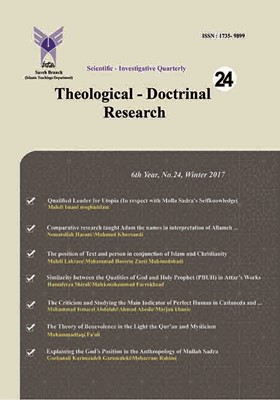Qualified Leader for Utopia (In respect with Molla Sadra's Selfknowledge(
Subject Areas : کلام اسلامی
1 -
Keywords: Mollasadra, transcendent political philosophy, utopia', s leader, leader', s onelself, Meritocracy,
Abstract :
Existance of a governer is a rational necessity and virtue and justice is it's most important characterisity in a society with Islamic identity. Holy Quran gradated headship from topmost God's headship to downward prophet's headship and then Imam's headship and in Imam's expenation Faqih's headship introduced as their complete reason for people. The question is what is the fact of headship with graded flow that begins from the real God's headship and ends to believer's headship? To answer this Question should be recognized God's successor that have divine aspect and mundane, and this makes importat understanding the deep human's existance layer. Since human being's creation with beginning of thought and wisdom, philosophers remarked the selfknowledge's issue and philosoper Mollasadra structured selfknowledge realm with his firm transcendent wisdom foundations like his other solicitude and innovation and based on revelation and intuition introduced characteristics of qualified leadership oneslef. Society by his approach is a set of human being oneselfs and is a position for human being's oneself's evolution and there is correspondence between educative and political society priorities; He also constructed transcendent wisdom principals like originality and gradation in existance and between symmetry good and existance to explain the fact of oneself and fact of society, and according to that known as maturity of society in following of excellence to construct utopia that "wisdom Theologian" gave sprit and exhilaration to that society like heart and strongly stand against moral vices to influence society's framework. Thus qualification the leadership of utopia is it's leader based on human being's evolution. This paper is result of research and studying in different Mollasadra's work and deduction of his thought in his social and political works
1. ابن سینا ابوعلی، (۱۳۳۳)، عیون الحکمه، تهران: دانشگاه تهران.
2. اکبریان رضا، (۱۳۸۶)، حکمت متعالیه و تفکر فلسفی معاصر، انتشارات بنیاد حکمت اسلامی صدرا.
3. جوادی آملی عبدالله، (۱۳۸۴)، حق و تکلیف در اسلام، تحقیق و تنظیم مصطفی خلیلی، قم: مرکز نشر اسراء.
4. سهروردی شهاب الدین یحیی، (۱۳۷۲)، مجموعه مصنفات شیخ اشراق، ج2 و ج 3، تصحیح و مقدمه هانری کربن و حسین نصر، تهران: وزارت فرهنگ و آموزش عالی، موسسه مطالعات و تحقیقات فرهنگی.
5. شیرازی صدر الدین محمد، (۱۳۸۳)، الحکمه المتعالیه فی الاسفار الاربعه، ج1، تصحیح و تعلیق غلامرضا اعوانی، تهران: بنیاد حکمت اسلامی صدرا.
6. شیرازی صدرالّدین محمد، (۱۳۸۲)، الشواهد الربوبیه فی المناهج السلوکیه، تصحیح، تحقیق و مقدمه سیدمصطفی محقق داماد، به اشراف سید محمد خامنهای تهران،: بنیاد حکمت اسلامی صدرا.
7. شیرازی صدرالدین محمد، (۱۳۸۱)، المبدء و المعاد فی الحکمه المتعالیه، جلد 2، تصحیح، تحقیق و مقدمه محمد ذبیحی و جعفر شاه نظری، به اشراف سید محمد خامنهای، تهران:انشارات بنیاد حکمت اسلامی صدرا.
8. شیرازی صدرالدین محمد، تفسیر القرآن الکریم ج2.
9. شیرازی صدرالدین محمد، (۱۳۶۲)، رسائل فلسفی، المسائل القدسیه، با تعلیق و تصحیح سید جلال الدین آشتیانی، قم: چاپ دوم، دفتر تبلیغات اسلامی.
10. شیرازی صدرالدین محمد، (۱۳۶۷)، شرح اصول الکافی، تصحیح محمد خواجوی، پژوهشگاه علوم انسانی و مطالعات فرهنگی ج2.
11. شیرازی صدرالدین محمد، (۱۳۸۲)، شرح و تعلیقه بر الهیات شفاء، انتشارات حکمت اسلامی صدرا، جلد اول.
12. شیرازی صدرالدین محمد، (۱۳۸۱)، کسر اصنام الجاهلیه، تصحیح، تحقیق و مقدمه: محسن جهانگیری، تهران:انشارات بنیاد حکمت اسلامی صدرا.
13. شیرازی صدرالدین محمد، (۱۳۸۶)، مفاتیح الغیب، ج2، تصحیح، تحقیق و مقدمه: نجفقلی حبیبی، تهران:انشارات بنیاد حکمت اسلامی صدرا.
14. شیرازی صدرالدین محمد، (۱۳۸۱)، الاسفار الاربعه، ج2، تصحیح، تحقیق و مقدمه سیدمصطفی محقق داماد، به اشراف سید محمد خامنهای تهران،: بنیاد حکمت اسلامی صدرا.
15. شیرازی صدرالدین محمد، (۱۳۸۲)، الاسفار الاربعه، ج5، تصحیح، تحقیق و مقدمه رضا محمد زاده، به اشراف سید محمد خامنهای تهران،: بنیاد حکمت اسلامی صدرا.
16. شیرازی صدرالدین محمد، (۱۳۸۲)، الاسفار الاربعه، ج6، تصحیح، تحقیق و مقدمه سیدمصطفی محقق داماد، به اشراف سید محمد خامنهای تهران،: بنیاد حکمت اسلامی صدرا.
17. قراملکی احد فرامرز، (۱۳۸۸)، روش شناسی فلسفه ملاصدرا، تهران: انتشارات حکمت اسلامی صدرا، 1388.
18. کاپلستون فردریک، (۱۳۸۰)، تاریخ فلسفه، جلد ۶، ترجمه اسماعیل سعادت و منوچهر بزرگمهر تهران: انتشارات سروش، چاپ سوم.
19. مصباح یزدی محمد تقی، (۱۳۶۵-۱۳۶۴)، آموزش فلسفه، ج 2، تهران: سازمان تبلیغات اسلامی، معاونت فرهنگی.
20. مصباح یزدی محمدتقی، (۱۳۷۶)، اخلاق در قرآن، ج2، تحقیق و نگارش محمدحسین اسکندری، انتشارات موسسه آموزشی پژوهشی امام خمینی.
21. نصری عبدالله، (۱۳۸۰)، سفر نفس، تقریرات استاد مهدی حائری یزدی، تهران: نقش جهان

